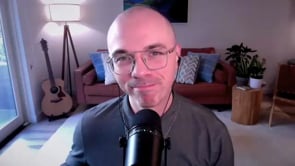New This Week: Somatic Meditation!
I created a meditation for you! For this week, I wanted to try something special, so I made a guided meditation to help us start the week with a sense of security and intention. I'd love to hear your thoughts! What do you feel during the meditation? What intentions are you setting for the week? Share your experiences in the comments below. Do you want more of these?
7
3
New comment 6d ago

Arriving New and Fresh
This week’s meditation is all about arriving fresh in each moment. Together, we’ll explore how to gently set down what’s weighing us, loosen the body, and meet life with curiosity and ease. If you’ve been feeling heavy or stuck, this practice invites lightness and a sense of starting anew, moment by moment. Join us to reconnect, release, and feel lighter. 💫 What’s one thing you’d like to gently set down this week?
1
0

How to Find Your Unique Voice
Your unique voice is primordial, it occurs and is found before words occur. It’s first felt as sensations in my body, as images and emotions. It then goes into a complex process in the brain to be translated into words that are spoken, creating a “voice.” But here’s the truth: you learned your voice a long time ago, and it hasn’t gone anywhere. It’s still there, maybe a little buried, but in the stillness, if you listen attentively and with patience, it will show up really naturally and simply. Your unique voice isn’t something that’s heard—it’s something that’s FELT… (by you, by others.) I can tell when you speak, if you’re feeling or if those words are empty. This is the essence of finding your unique voice as a coach, as a guide, or as a human being. When your voice comes from that deep place within you, others will feel it too—it lands differently. 🌱 Here’s your invitation to reflect: When you speak, do you feel your words in your body? Or do they feel disconnected from what you’re truly experiencing? Are you slowing down to actually SAY the words you’re saying? Take a moment to sit in stillness, listen attentively, and notice what shows up. Let your unique voice rise—not as something you need to find, but as something you remember. ♥️
1
0

Why it's So Hard to Change Habits...and how to...
Part of why I love somatic coaching is that it's the meeting place of the body and the mind—bottom-up and top-down. This integration is powerful because as we begin to acknowledge the body and square up to the reality of things, we don't have to try so hard. Old symptoms and habits simply fall away. For example, when it comes to eating well or working out consistently, we don’t have to force ourselves into rigid plans or punish ourselves for “falling off.” Instead, we can start to listen to what the body needs. When we eat foods that feel nourishing and energizing rather than following a plan out of guilt, the habit naturally sticks. Similarly, working out can stop being a chore and become something we look forward to because it feels good in our body. We don’t have to work at being our best selves—we simply are that. Life becomes easier. We're not stuck in cycles of shame or guilt, trying to "fix" ourselves. Instead, we’re doing what feels good, naturally. We become the person we want to be, but without the exhausting effort. Our goals and habits start to align effortlessly, and we're no longer working against ourselves. Spending less time on our phones, for instance, can stop feeling like a “should” and become a choice because we notice how much more present and alive we feel when we’re not scrolling. Sometimes, we can let go of the deeply ingrained habit or pattern of "trying hard" because that’s what we’ve relied on for so long. We may have learned to find value in effort—believing things only matter if they’re difficult. We can shift this by cultivating a sense of comfort and safety in the body. When the body begins to feel safe, the mind can naturally follow. This creates space for the realization that life can, in fact, be simple and easy at times. Eating well, working out, or setting down the phone can come from a place of feeling good in your body, rather than forcing yourself to meet a standard. It’s about trusting that ease doesn’t mean we’re doing less; it means we’re finally aligned.
2
4
New comment Nov 20

Working with our Nervous System
Understanding the nervous system is a powerful way to support ourselves (and our clients). Polyvagal theory is why we respond the way we do throughout the day. Our ebbs and flows...and how we can guide ourselves and others toward more resilience, calm, and true connection. Polyvagal theory was developed by Dr. Stephen Porges and explains how our nervous system navigates different levels of safety and connection. Polyvagal theory describes the spectrum of responses that we have with three key landmark states (Rather than simply being in “fight-or-flight"): - Ventral Vagal State (Safe and Social): In this state, we feel grounded, connected, and open—ideal for building trust and connecting deeply with our clients. It’s the state where creativity, empathy, and presence thrive, and it’s where we want to be when supporting others. - Sympathetic State (Mobilization): This is our mobilization energy. We mobilize to take action. When we experience this need to mobilize because of a "threat", we move into this state as a protective response. While it's useful in moments of perceived danger, when we hang out here for too long, it leads to anxiety or burnout, and lots of other potential symptoms... - Dorsal Vagal State (Shut Down and Collapse): When stress or overwhelm becomes too great, we may move into a state of shutting down, feeling numb or “checked out.” This can be a barrier to engagement and creativity. In somatic coaching, understanding Polyvagal theory equips us to recognize where we (and our clients) are on this spectrum. By identifying these states, we can use body-based practices to gently guide ourselves back to a place of calm, connection, and resilience. This knowledge supports us in leading clients effectively while modeling the emotional resilience and groundedness we aim to foster in them. Where do you spend most of your time on this spectrum? Do you feel more grounded and present, or do you recognize moments of stress or even shut down?
0
0

1-8 of 8

skool.com/somatic-coaching-community
Deepen your practice, take Inspired Action, and connect with others about holistic wellness.
powered by






